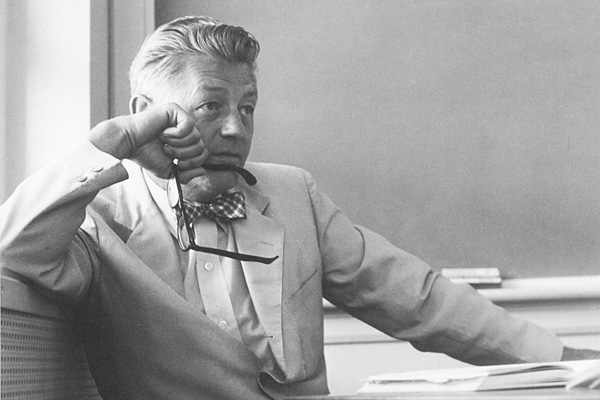Wallace Stegner on Largeness
categories: Cocktail Hour
3 comments
 I’ve spent a lot of time over the last few years in the company, or at least with the mind and words, of Wallace Stegner. It has been a bracing experience. One thing I’ve noticed about his thinking is that there is always a movement toward the general, an imperative to think more broadly and openly, a preference for the long view over the short, the large over the small. This was not just an intellectual commitment, but a spiritual, or at least a personal, one. “Largeness is a lifelong matter,” he once said. The goal was (and is) magnanimity.
I’ve spent a lot of time over the last few years in the company, or at least with the mind and words, of Wallace Stegner. It has been a bracing experience. One thing I’ve noticed about his thinking is that there is always a movement toward the general, an imperative to think more broadly and openly, a preference for the long view over the short, the large over the small. This was not just an intellectual commitment, but a spiritual, or at least a personal, one. “Largeness is a lifelong matter,” he once said. The goal was (and is) magnanimity.
The “largeness” quote is contained and given context below by Stegner’s answer to this interview question: Should the teacher, in the process of instruction, consciously try to shape a student’s personality or enlarge him or her as a human being?
Here’s his reply:
Well, I have some fairly strong feelings about that. I do not believe I can teach anybody to be a bigger or better or more humane person. But I do subscribe to the notion that, in order to write a great poem one should be, in some sense or another, a great poet. This suggests that any writer had better be concerned with the development of his personality and his character.
I don’t believe, with Oscar Wilde, that the fact that a man is a poisoner has nothing to do with his prose. It does have something to do with his prose. A poisoner will write a poisoner’s prose, however beautiful. Even if it has nothing to do with his private life, personal morality, or his general ethical character, being a poisoner suggests a flaw somewhere—in the sensibility or humanity or compassion or the largeness of mind—that is going to reflect itself in the prose.
Most artists are flawed; but they probably ought to make an effort not to be. But how do you teach people to enlarge themselves in order to enlarge their writing? It is a little like asking them to “commit experience” for literary puprposes.
Largeness is a lifelong matter—sometimes a conscious goal, sometimes not. You enlarge yourself because that is the kind of individual you are. You grow because you are not content not to. You are like a beaver that chews constantly because if it doesn’t its teeth grow long and lock. You grow because you are a grower: you’re large because you can’t stand to be small.
If you are a grower and a writer as well, your writing should get better and larger and wiser. But how you teach that, the Lord knows.
I guess you can suggest the ideal of it, the idea that it is a good thing to be large and magnanimous and wise, that it is a better goal in life than pleasure and money and fame. By comparison, it seems to me, fame and money, and probably fame as well, are contemptible goals.
I would go as far as to say that to a class. But not all the class would believe me.
This interview, and a whole lot else can be found, in Wallace Stegner’s On Teaching and Writing Fiction.
Click HERE to see my article in Orion on Edward Abbey’s FBI file.
All the Wild That Remains: Edward Abbey, Wallace Stegner, and the American West is coming out in April. “Two extraordinary men, and one remarkable book. To understand how we understand the natural world, you need to read this book.” –Bill McKibben


Thanks, George. Yes, I often thought of Johnson while studying Stegner. Both were tought-minded realists with big hearts. “A liberal with a conservative temperament,” was what John Daniels called WS.
tough-minded
I bet W.S. was a fan of Samuel Johnson–looking forward to your book.